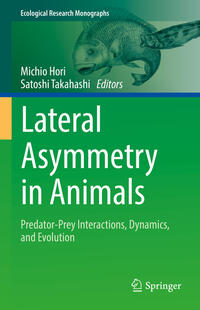
This book presents the latest research findings on the laterality of fish and other animals. It describes all aspects of lateral asymmetry, including ecology, morphology, behaviour, dynamics of lefty and righty morphs, genetics and evolution, through field observations, experiments and modeling. Lateral asymmetry in scale-eating cichlids gives a simple and beautiful example of negative frequency-dependent selection and resulting oscillation of lefty and righty morph frequencies. Lateral dimorphism is found not only in scale-eaters but in all orders of fish, shrimps and cuttlefish. Lateral asymmetry interacts between species through "cross-predation." Contrary to fish, lateral asymmetry in snails acts as, in most cases, positive frequency-dependent selection and provides deep insights into speciation. Especially, snakes eating righty snails facilitate speciation of lefty snails.As a collaboration work of field ecologists and theoretical biologists, this book covers a variety of topics on lateral asymmetry, which are consistently related to predation. The topics include behavioral ecology, population dynamics, physiology, evolution, genetics, development, learning and neuroscience, statistics, with the subjects of fish, shrimp, prawn, and crayfish, crab, cuttlefish, and snake and snail. Chapters cover new research results such as cuttlefish laterality dynamics, interaction between laterality of snails and snakes, evolution of laterality genetic system, and statistical analysis of laterality oscillation. Readers will appreciate the simplicity and beauty of lateral asymmetry and its profound impact on ecology and evolution.